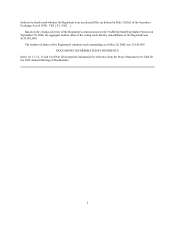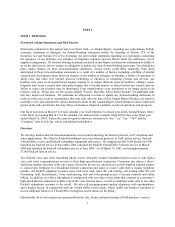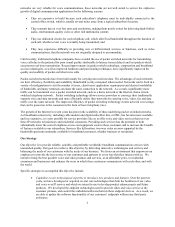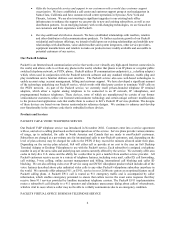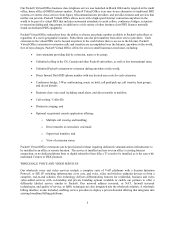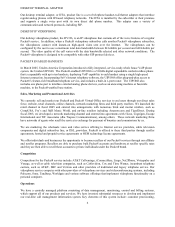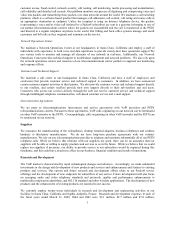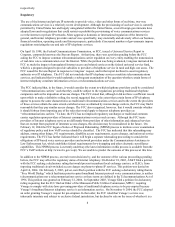8x8 2005 Annual Report Download - page 12
Download and view the complete annual report
Please find page 12 of the 2005 8x8 annual report below. You can navigate through the pages in the report by either clicking on the pages listed below, or by using the keyword search tool below to find specific information within the annual report.9
telecommunications service or an information service. Judicial appeals from the FCC’s Vonage order are pending.
On February 5, 2004, SBC Communications Inc. filed two petitions with the FCC relating to IP communications.
The first requests a declaratory ruling that all services offered on an IP platform are interstate information services,
not telecommunications services, and that they are immune from state regulation as a result. The FCC has
incorporated this petition into its generic IP-enabled services rulemaking, where it will consider the regulatory status
of Internet protocol voice communications. The second SBC petition requests that the FCC forbear from applying
certain common carrier regulation to services offered on IP platforms. On May 5, 2005, the FCC issued an opinion
and order denying SBC’s forbearance petition, and concluding that the petition was procedurally defective.
Several states have also demonstrated an interest in regulating VoIP services at a state public utility level, as they do
for providers of traditional telephone service from regulated carriers. In certain cases, these state governments and
their regulatory authorities have moved to assert jurisdiction over the provision of intrastate IP communications
services (calls that begin in that state and end in that state) where they believe that their telecommunications
regulations are broad enough to cover regulation of IP services. If this trend continues, and if state regulation is not
preempted by action by the FCC we may become subject to a "patchwork quilt" of state regulations and taxes, which
would increase our costs of doing business, and adversely affect our operating results and future prospects.
We have been contacted by several state regulatory authorities regarding our Packet8 service. By letter dated August
13, 2003, the Public Service Commission of Wisconsin (the WPSC) notified us that the WPSC believes that we, via
our Packet8 voice and video communications service, are offering intrastate telecommunications services in the state
of Wisconsin without certification from the WPSC. According to the WPSC's letter, it believes that we cannot
legally provide Packet8-based resold intrastate services in Wisconsin without certification from the WPSC. In
addition, the WPSC believes that Packet8 bills for intrastate services to Wisconsin customers are void and not
collectible. The letter also states that if we do not obtain certification to offer intrastate telecommunications services,
the matter will be referred to the State of Wisconsin Attorney General for enforcement action. The letter also states
that even if we were certified by the WPSC, the previous operation without certification may still subject us to
referral to the State of Wisconsin Attorney General for enforcement action and possible forfeitures. On October 15,
2003, we responded to the WPSC and disputed its assertions by asserting that we are an information services
provider and not a telecommunications provider. While we do not believe that the potential amounts of any
forfeitures would be material to us, if we are subject to an enforcement action, we may become subject to liabilities
and may incur expenses that adversely affect our results of operations.
On September 17, 2003, we were contacted by the Ohio Public Utilities Commission (OPUC) and asked to respond
to a questionnaire on Voice over IP technologies that the OPUC is conducting. The OPUC inquired as to the nature
of our service, how it is provided, and to what Ohio residents the service is made available. The questionnaire did
not contain any assertions regarding the legality of the Packet8 service under Ohio law or any statements as to
whether the OPUC believes we are subject to regulation by the state of Ohio. We responded to this questionnaire on
October 20, 2003.
On September 22, 2003, the California Public Utilities Commission (CPUC) sent us a letter that alleged that we are
offering intrastate telecommunications services for profit in California without having received formal certification
from the CPUC to provide such service. The CPUC also requested that we file an application with the CPUC for
authority to conduct business as a telecommunications utility no later than October 22, 2003. After consultation
with regulatory counsel, we responded to the CPUC, disputed its assertions and did not file the requested
application. In our October 22, 2003 response to the CPUC, we disagreed with the CPUC's classification of us as a
telephone corporation under the California Public Utilities Code. We asserted that we are an information services
provider and not a telecommunications provider. The letter from the CPUC did not indicate, and we cannot predict,
what any potential penalties or consequences in failing to obtain certification might be. If we are subjected to
penalties, or if we are required to comply with CPUC regulations affecting telecommunications service providers,
our business may be adversely affected. On November 13, 2003, the CPUC held a hearing in San Francisco to hear
testimony from CPUC staff and industry representatives regarding what course of action the CPUC should take with
respect to Internet telephony. A representative from 8x8 testified at the hearing. On February 11, 2004, the CPUC
stated that, as a tentative conclusion of law, they believe that VoIP providers are telecommunications providers and
should be treated as such from a regulatory standpoint. The CPUC initiated an investigation into appropriate
regulation of VoIP providers under state law, and acknowledged that it has not enforced the same regulatory regime
over VoIP as applies to telecommunications services. The CPUC is considering a number of potential regulatory
requirements, including contribution to state universal service programs, provision of 911 services, payment of
access charges to interconnect with the PSTN and compliance with NANP protocols and basic consumer protection
laws. The CPUC is also considering whether exempting VoIP providers from requirements applicable to traditional


